Rainer Kersten
Rainer Kersten does not only translate for publishers in Switzerland, but has significantly contributed to the image of literature from Flanders and the Netherlands in Switzerland as the translator of Arnon Grunberg. Kersten is the translator of among others Lanoye, Grunberg, Verhelst and Verhulst. In 2002 he received the NRW-Literaturpreis for his German translations and in 2015 he was awarded the Else-Otten-Preis for his translation of Dimitri Verhulst's Der Bibliothekar, der lieber dement war als zu Hause bei seiner Frau [The Librarian who Preferred Suffering Dementia to Being at Home with his Wife].

„I'm fascinated by Literature, that combines rough tone and literary aspirations / poetry and takes an interest in the world and society. To achieve this balancing between staying true to the original, philological exactness and the effect in German is an art. I translate for the enthusiastic, discerning reader." (Reiner Kersten, n.d.)
Tom Lanoye
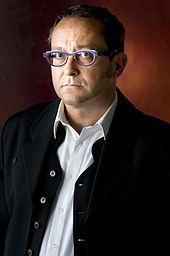
Rainer Kersten made his debut in the German language area with the translation of Tom Lanoye's coming-out story Kartonnen Dozen (Pappschachteln [Cardboard Boxes]). When Flanders and the Netherlands first took part at the Frankfurt Book Fair as guest of honor, new authors and young translators were sought after. Kersten seized the chance and chose well; Tom Lanoye's Pappschachteln was well received:
Lanoye's style is witty and ironic, honest and full of pathos, as befits the age of the first-person narrator. The examination of the consequences of 1968 at school, the all-suffocating tolerance, is one of the novel's showpieces. Tom Lanoye - a young successor of the great Flemings Louis Paul Boon and Hugo Claus (Brockschmidt, 1994).
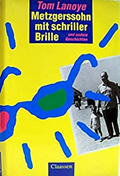
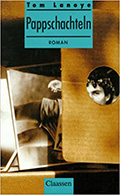
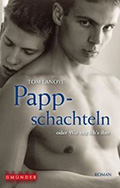
Two years after Pappschachteln, the collection of short stories Metzgerssohn mit schriller Brille und andere Geschichten [Butcher's Son with Flashy Glasses and Other Stories] was published, also by Claassen as Pappschachteln before. But Tom Lanoye's breakthrough in the German language area was still some time away. It finally came about with the performance of Schlachten! - nach den Rosenkriegen von William Shakespeare (1999), a translation by Klaus Reichert and Rainer Kersten of Ten Oorlog [To War] (1997). Already in 1998, the Frankfurter Allgemeine had written about the performance of Ten Oorlog in Amsterdam:
„Like a gourmet in front of the buffet, Lanoye picks out the most delicious of the dramas. [...] The violence, however, lies more in words than in actions. [...] Nowhere does the cheeky treatment of the master seem inappropriate [...] In guttural Flemish Lanoye lets obscene juices drip from the metaphors, mixing Renaissance poetry with pop music language fragments, television slang, gutter jargon, but tied into the declamatory corset of pentameter jambs.“ Schumer, 1998).
Schlachten, directed by Luc Perceval, was performed in 1999 as part of the Salzburg Festival. In 2000, the magazine Theater Heute voted Lanoye's and Perceval's show best play of the year. In 2021, Schlachten, more specifically the texts from Eddy the King, will returned to the Salzburg Festival once again, this time in the form of the equally highly acclaimed co-production by the Deutsche Schauspielhaus in Hamburg and the Salzburger Festspiele: Richard the Kid & the King (Video). Since Schlachten, it has been impossible to imagine the German-language theatre world without Tom Lanoye. He also had great successes with Mamma Medea (2003) and Atropa (2009), Lanoye's adaptation of the tragedies about the Trojan War.

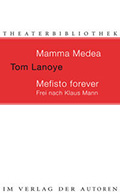

Tom Lanoye's oeuvre is very extensive and comprises not only plays but also a great deal of prose and poetry. Lanoye is one of the most widely read and praised authors of the Dutch language area. Much remains to be discovered of his work. It is to be hoped that Rainer Kersten will find a publisher for it. This also applies to Peter Verhelst. Until today, Rainer Kersten has only translated theatre texts by the poet, novelist, playwright, performer and director. In the late 1990s, Barbara Heller translated two novels by Verhelst for publishing house Goldmann in Munich (Das Muskelalphabet [The Muscle Alphabet] and Der Farbenfänger [The Color Catcher]), but since then no prose by Verhelst has appeared in German translation. So here too, there still remains something to be discovered.
For enthusiastic, discerning readers
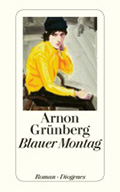
Rainer Kersten's second sucess story is Arnon Grunberg. In 1997, his first translation of Grunberg's Blauwe Maandagen (1994), Blauer Montag, was published by Diogenes in Zurich, and became a lasting success. Grunberg quickly became one of the best-known authors of the Swiss publisher's Dutch-language titles. Since 1997, a new novel by Grunberg or his alter ego Marek van der Jagt had been published in Zurich almost every year. Nevertheless, Arnon Grunberg left Diogenes for the German publisher Kiepenheuer & Witch in 2014, together with Rainer Kersten.
Why Grunberg left Diogenes is not known. Did Kiepenheuer offer better conditions? Did Grunberg want to appeal to a different audience? In any case, Rainer Kersten had not yet published a translation with Kiepenheuer before 2014, so that was not the reason for the move. Meanwhile (status 2021) more than 7 works by Grunberg have been published by Kiepenheuer.

Less spectacular than Grunberg and Lanoye but no less successful is the reception of the work of Flemish author Dimitri Verhulst. Verhulst made his German-language debut in 2004 with Problemski Hotel published by Claassen-Verlag, the same publisher that was responsible for Lanoye's German-language debut. The translator of the story of Bipul Masli, who wants to build a career as a photographer but ends up in a shelter for asylum seekers, was Barbara Heller, Peter Verhelst's translator. The translation was a success. Two years later it was also published by List in Munich. Nonetheless, Verhulst's next book was no longer published by Claassen. Die Beschissenheit der Dinge [The Misfortunates], Verhulst's most successful novel to date (translated into more than ten languages), was translated by Rainer Kersten and published by Luchterhand in Munich. In 2009 the book was adapted into a movie. (Trailer)
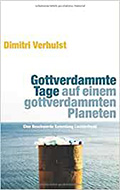
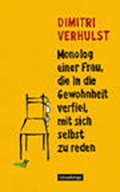

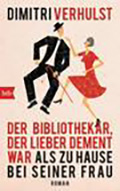
Between 2010 and 2020 translations of Verhulst appeared regularly in the German language area including Gottverdammte Tage auf einem gottverdammten Planeten [Goddamned Days on a Goddamned Planet] (2010), Die letzte Liebe meiner Mutter [My Mother's Last Love] (2011), Monolog einer Frau, die in die Gewohnheit verfiel, mit sich selbst zu reden [Monologue of a Woman Who Fell into the Habit of Talking to Herself] (2013) and in 2014 Der Bibliothekar, der lieber dement war als zu Hause bei seiner Frau [The Librarian Who Preferred Being Dementic to Being at Home with His Wife].
„Verhulst succeeds in mixing cynical and bitter satire with moving accusation. He describes a welfare society without empathy, a way of dealing with the sick that is determined by principles of functionality and financial viability, and an eager but ultimately powerless nursing staff. - Despite the serious subject matter, this is an enjoyable, stirring and sincere book. Also because of the realisation that one can flee, but that there is no real escape.“ (Mürzli, 2014)
Wide spectrum
Rainer Kersten does not limit himself to the above-mentioned authors. The range of Dutch literature presented by him is vast. Kersten has his hands full translating the work of the above-mentioned authors, but succeeds time and again in placing new accents. It is clear that Kersten has a preference for theatre texts (he also translated works by Maria Goos and Jeroen van den Berg). Kersten was apparently inspired by the preparations for the second participation of Flanders and the Netherlands at the Frankfurt Book Fair as guest of honour in 2016. He finally managed to present a book (Buchstabe und Geist - Eine Spukgeschichte [Letter and Ghost - A Ghost Story]) by Frans Kellendonk his "idol" (Kersten, 2021). In the same year, another book by Dimitri Verhulst (Die Unerwünschten [The Unwanted]) was published, as well as Das schönste Mädchen von Genua [The Prettiest Girl in Genoa] by Ilja Leonard Pfeijffer.


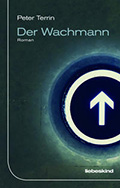
Two years later, the translation of Peter Terrin's "explosive mix of science fiction and 'Waiting for Godot'" (Cone, 2018), Der Wachmann [The Guard] (2018), was published. For this book, Terrin had received the literature prize of the European Union in 2010. The absurd book attracted attention, was extensively presented on television and adapted as a radio play (3Sat, 2018). In 2021, the equally oppressive novel Blanko was published. This book, is also clearly making an impression.
"[Blanko] shows with tremendous urgency what a miracle it actually is that we trust other people. If we trust them." (Solloch, 2021)
With Peter Terrin Kersten has once again presented an author who has attracted a lot of attention. In the meantime, Rainer Kersten also successfully translated prose by Johan de Boose (Das Fluchholz [The Cursed Wood], 2021) and by Hanna Bervoets (Flauschig [Fluffy], 2021; Dieser Beitrag wurde entfernt [This Post has been Deleted], 2022).
(Herbert Van Uffelen)
References
Brockschmidt, Rolf: Unter dem Deckel - Kramen in den Jugenderinnerungen eines katholischen Flamen.In: Der Tagesspiegel, Issue: 21. Aug., (1994)
Schümer, Dirk: Amboß Shakespeare. Schlagende Geschichte: Alle Königsdramen in Rotterdam. In: Frankfurter Allgemeine Zeitung, Vol.: Nr. 22 [27.01.1998] - Frankfurt, (1998).
Mürzli, Heimo: Verhulst, Dimitri - Der Bibliothekar, der lieber dement war als zu Hause bei seiner Frau. In: Wiener Zeitung, Issue: 20. Juli, (2014).
Solloch, Alexander: Blanko - Ein beklemmender Roman von Peter Terrin. In: NDR - Kultur, Issue: 16. Juni, (2021).
Kegel, Sandra: Paranoia in der Tiefgarage. In: Frankfurter Allgemeine, Issue: 7. Juni, (2018).
Kersten, Rainer: Mein erstes Mal - Rainer Kersten über „Kartonnen dozen“ von Tom Lanoye. In: TraLaLit - Magazin für übersetzte Literatur, Issue: 1. Sept., (2021).
Kersten, Rainer: Rainer Kersten. In: Nederlandse Letterenfond (ed.) vertalingen database, (n.d.). http://www.letterenfonds.nl/en/nlf_translator/26/rainer-kersten [Juli 2022]
3Sat (ed.): Der Wachmann. In: 3Sat - Buchvorstellung, Issue: 11. März, (2018).
